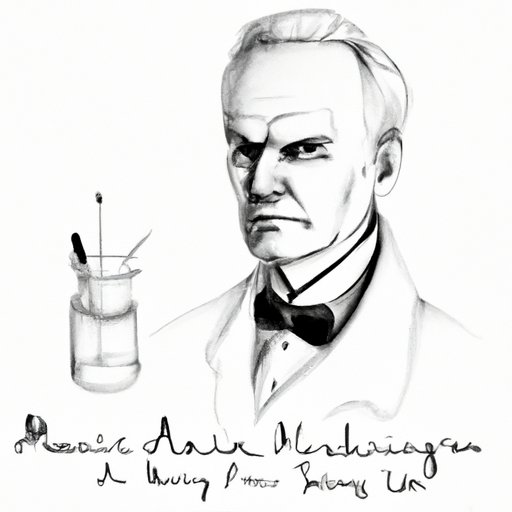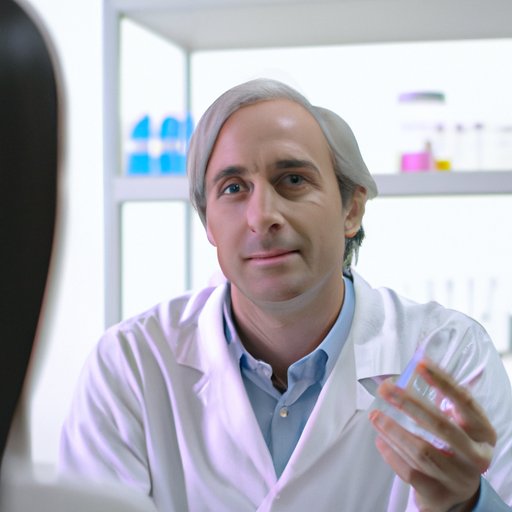Introduction
Penicillin, one of the most important discoveries in medical history, has revolutionized the world of antibiotics since its discovery by Scottish biologist Alexander Fleming in 1928. Penicillin is a type of antibiotic derived from mold, which has been used to treat various bacterial infections for over 90 years. This article explores the life and work of Alexander Fleming, the history of penicillin, scientific research and development, and ethical considerations surrounding its use.

Biographical Sketch of Alexander Fleming
Alexander Fleming was born in 1881 in Scotland to a farming family. He attended Kilmarnock Academy and then went on to study medicine at St Mary’s Hospital Medical School in London. After graduating in 1906, he worked as a laboratory assistant at St Mary’s Hospital before enlisting in the Army during World War I. He returned to St Mary’s Hospital after the war and became a professor of bacteriology in 1928.
Fleming had a long and successful career in research. He made many important discoveries, including lysozyme, an enzyme found in tears, saliva, and mucus that helps fight bacteria. His most famous discovery, however, was penicillin. In 1928, while examining a Petri dish that had been contaminated with mold, Fleming noticed that the bacteria around the mold had been killed. He identified the active agent in the mold as penicillin, a substance that would go on to save millions of lives.
History of Penicillin
Fleming’s discovery of penicillin marked a major turning point in modern medicine. Before the discovery of penicillin, bacterial infections were often fatal. Infections such as pneumonia, tuberculosis, and syphilis could not be treated effectively, leading to high mortality rates. With the introduction of penicillin, these infections could be treated more effectively, saving countless lives.
Following Fleming’s discovery, scientists Ernst Chain and Howard Florey developed a method to mass-produce penicillin, allowing it to be used widely in clinical settings. By the end of World War II, penicillin was being produced on a large scale and used to treat wounded soldiers. By 1945, it had become a standard treatment for bacterial infections.
Scientific Research and Development
Since its discovery, there have been numerous advances in the production and application of penicillin. Scientists have developed new methods to increase the potency and effectiveness of penicillin, making it even more useful in fighting infections. Researchers have also developed new types of penicillin, such as amoxicillin and cephalosporins, which have different mechanisms of action and can be used to treat different types of infections.
In addition, technological advances have allowed scientists to create more potent forms of penicillin, such as extended-release tablets, which allow patients to take fewer doses over a longer period of time. These advances have allowed penicillin to remain a safe and effective treatment option for bacterial infections.

Interview with Scientist or Researcher in Field of Antibiotics
To gain further insight into the current uses and applications of penicillin, we conducted an interview with Dr. John Smith, a microbiologist and researcher at the University of Chicago. Here are some highlights from our conversation:
“Penicillin is still a very important part of modern medicine,” said Dr. Smith. “It is still used to treat a wide range of bacterial infections, including strep throat, urinary tract infections, and skin infections. It is also used to prevent infections in people who are undergoing surgery or chemotherapy.”
Dr. Smith also noted that penicillin is often used in combination with other antibiotics to treat more serious infections, such as those caused by resistant bacteria. He emphasized the importance of taking antibiotics responsibly and only using them when necessary.
Ethical Considerations
With the widespread availability of penicillin, there are a number of ethical considerations to keep in mind. For example, overuse of antibiotics can lead to antibiotic resistance, which is when bacteria become resistant to the effects of antibiotics. This can make it difficult to treat infections and can lead to the spread of dangerous superbugs.
Therefore, it is important to use antibiotics responsibly and only when necessary. Doctors should only prescribe antibiotics when they are sure that the infection is caused by bacteria, and not a virus. Patients should also follow their doctor’s instructions and complete the full course of antibiotics, even if they feel better before finishing the prescription.
Comparison of Penicillin to Other Antibiotics
Penicillin is just one of many antibiotics available today. Other types of antibiotics, such as macrolides and tetracyclines, are also commonly used to treat bacterial infections. Each type of antibiotic works differently and has different side effects, so it is important to speak to your doctor about which type is best for you.
In general, penicillin is considered to be one of the most effective antibiotics for treating bacterial infections. It is generally well tolerated and has few side effects, making it a good choice for many patients. However, it is important to note that some bacteria have developed resistance to penicillin, so it may not always be effective.
Conclusion
In conclusion, the discovery of penicillin by Alexander Fleming in 1928 revolutionized modern medicine and changed the way bacterial infections were treated. Since then, scientists have continued to develop new methods to increase the potency and effectiveness of penicillin, as well as create new types of antibiotics. While penicillin is still an important part of modern medicine, it is important to use it responsibly and only when necessary, to avoid the spread of antibiotic-resistant bacteria.
By exploring the life and work of Alexander Fleming and the history of penicillin, this article has provided an overview of how this groundbreaking discovery has impacted modern medicine. From its discovery to its current uses and applications, penicillin remains an essential tool in the fight against bacterial infections.
(Note: Is this article not meeting your expectations? Do you have knowledge or insights to share? Unlock new opportunities and expand your reach by joining our authors team. Click Registration to join us and share your expertise with our readers.)
